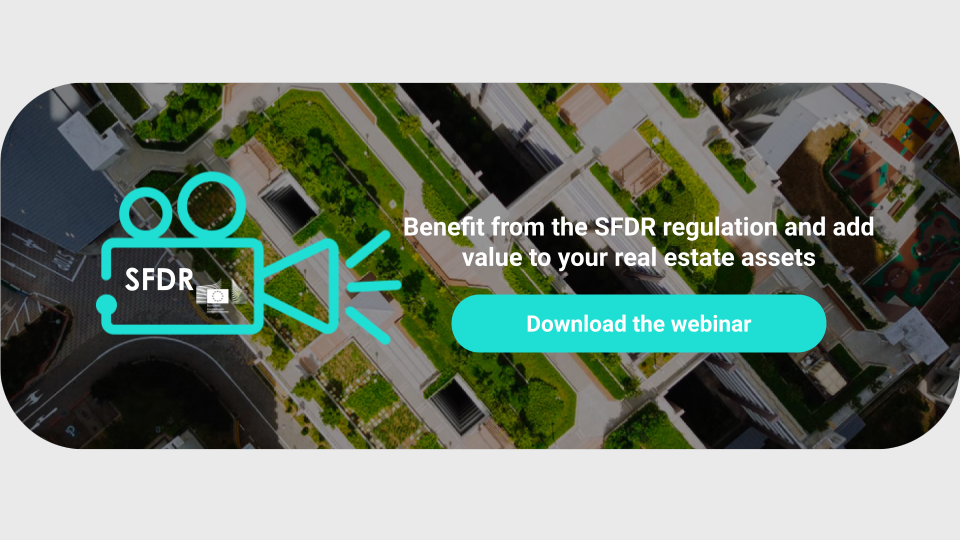Following the latest report from the IPCC, and as climate change effects are getting more and more visible in our everyday lives, regulations are mobilizing all around the globe. Regarding the real estate sector in France, the Tertiary Decree is the main character, subjecting all asset managers owning real estate assets in the country.
A brief recap of the challenges and obligations of the Tertiary Decree
The Tertiary Decree is part of a regulation that compels owners and tenants of tertiary buildings of an area over or equal to 1000 m2 to reduce their energy consumption by – 40% by 2030, – 50% by 2040, and – 60% by 2050.
To be compliant and define your most advantageous year of reference, you first need to know your global consumption, which includes common and private areas.
The common areas are relatively easy, as they are typically handled directly by the property managers, hence the data associated is accessible. On the other hand, the private areas are the focus of our article today: the data collection and declaration on your tenants’ side. Here are some best practices to help you achieve it.
Collection of consumption data from your tenants: why is it so complicated?
After taking a look at the pre-existing data and setting your KPIs, one of the main priorities in the process to comply with the Tertiary Decree is to make sure that the stakeholders required to implement actions are well aware of their responsibilities and fully aligned with the objectives. This is a hard mission to tackle, but as you prepare the field you’ll find this step will save you a lot of trouble.
Technically speaking, the collection method is similar to the one used in gathering the data from the communal areas. However, when your tenants are the ones in the hold of their energy contracts, the right to access the data is less obvious. In fact, the tenants’ data constitutes their personal data and, by definition, it’s confidential.
In an attempt to achieve collecting this data, you will have to – compulsorily – get their consent beforehand. For this, you can ask them to sign a single mandate letter that will allow you to legally collect their historic, present, and future consumption data. A mandate letter is a free contract in which a tenant authorizes a third party (like a service provider) to access their data. In making your building tenants sign a mandate letter, you are also asking for their legal permission to automate the consumption data collection directly from their energy providers and distributors.

Read also: Data collection: going for a pragmatic approach
Best legal practices to achieve data collection from your tenants
To simplify the energy consumption data collection for the private areas you should:
- Ask for the authorization to collect your tenants’ data directly in the lease: this will allow you to get their permission from the contract signature onwards. You won’t have to be after them or obliged to do constant follow-ups.
- Insert a data collection clause in the Property Manager’s contract: this will allow you to clarify their action perimeter and integrate them easier into your project.
- Insert a specific clause for data transference in regards to the energy providers: this will facilitate your data access as well as collection.
Best organizational practices to achieve data collection from your tenants
It is essential to articulate these practices with the legal ones:
- Prioritize the data collection according to the chosen strategy: it can be more reasonable to prioritize the data collection over certain buildings or meters, for example.
- Get the property managers involved from the beginning, they can be a good point of contact for your tenants. It is essential to bring these issues to their attention and get them on board from the start of your collection project.
- Coordinate the process among the different stakeholders: you should imperatively organize follow-up meetings with all the players to be aware of how the data collection project is advancing.
- Put in place a useful follow-up ritual and platform: to guarantee the efficiency of your follow-up meetings, we strongly advise you to equip yourself with a dedicated performance monitoring tool.
One step further
We have established some best practices on the legal and organizational side to be on top of data collection in regards to tenants, but we’d like to go a bit further. Once these practices are put in place, all the data is collected – both in common and private areas – and you’ve finally determined your year of reference (further knowledge on this, coming soon), the next step is the declaration of the data in OPERAT platform.
OPERAT platform is a regulatory tool created by the Ademe to follow up on the level of compliance in regards to the Tertiary Decree. Owners and tenants (or just owners) must declare their energy consumption data in OPERAT, annually. As we’ve previously expressed – and we cannot stress this enough – the integrity of the data is required.
Ademe – and Deepki – strongly recommend that communication and collaboration between stakeholders are the strongest tools to develop and put into practice, specifically regarding the declaration of data: the role of an owner is to be in the middle and design the communication strategy to constantly be in the loop about when modifications are performed, and, as well, in order not to have incomplete or duplicated data, as this may lead to sanctions. You need to understand that all stakeholders are legally compelled to reduce consumption and to respond in terms of information quality, completion, and deadlines, this means that the tenants can have their own strategies, as well.

These practices will help you strengthen your strategy but the most important thing to remember is that it’s more than a series of conversations and the more effort you put into the bases, the more engagement you’ll see in the result.
More content on the Tertiary Decree is coming, so bear with us a little longer. In the meantime, to be in the loop about regulation, don’t miss our upcoming SFDR webinar.



